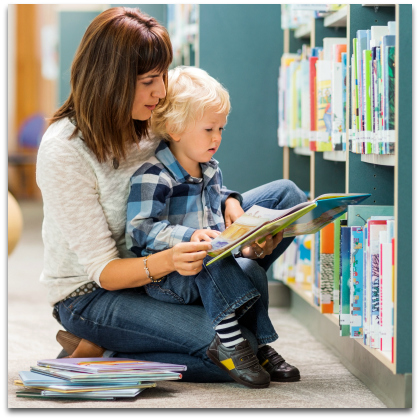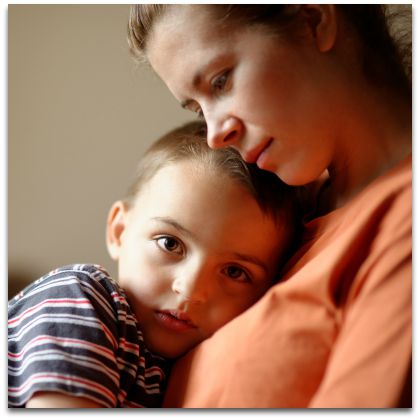 It was 5 pm on a Sunday when my phone buzzed. I did not recognize the number or the voice. “I’m sitting here beside your son at the bike park. Your husband has had an accident. Paramedics are on their way. He’s not okay.”
It was 5 pm on a Sunday when my phone buzzed. I did not recognize the number or the voice. “I’m sitting here beside your son at the bike park. Your husband has had an accident. Paramedics are on their way. He’s not okay.”
I looked around the living room. My infant was asleep, while my toddler and preschooler were playing around me. My 6-yr-old was with his semi-conscious father at a bike park an hour from home. We’d lived in Denver exactly eight weeks.
In that moment, life changed irrevocably for my family.
My husband survived the accident but had life-altering injuries. In the months that followed, I realized our lives were not going to go according to our plan.
Before becoming parents, we dreamed of the kind of childhood we would give our kids. We were certain we would never repeat our parents’ mistakes. We would never lose our temper or forget important days. They would never experience any of the hardships we did. No matter what, we would insulate them from suffering.
Unfortunately, life just doesn’t work that way.
Accidents, illnesses, pandemic, sudden job loss, divorce, financial strain, addictions.
At some point, all of us have to face the fact that our kids don’t get to live the fairy tale childhood we dreamed for them. Instead, many of them must deal with circumstances that are difficult for even adults to navigate.
Not only that, but we now have to learn to parent them through their hard seasons while also walking through the toughest times in our own lives.
When the life we planned for our children falls apart, when things go wrong in horrible, unexpected ways, how do we move forward as parents? How do we help our children move out of a crisis and toward a healthy life?
From my own experience, I found that during hardships we experience two distinct phases.
First, there’s the moment of crisis. The hospital stays, the day after an affair is exposed, the weeks after an unexpected job loss, months of global lock down. Even in critical moments, we still must parent our children. When the rug is pulled out from under us, what do we do next?
Second, we establish a “new normal” after the crisis ends. What was once unimaginable becomes a part of our lives, and we must find our new rhythm. In some ways this stage is harder than the first. Our communities will go back to their normal lives, while we need to forge ahead through unknown territory. Our children also have to make sense of their new circumstances. When the big moment is over, how do we lead them into our family’s new “normal”?
How do we manage each of these stages? What can we do to keep our sanity, while also shielding our children from the worst?
Here is what I have learned –
Phase 1: Dealing With An Unexpected Crisis As It Unfolds
1. Reach out for help. And when others offer help, say yes.
 Sometimes our crises are public. As soon as I hung up the phone that fateful day in 2013, I immediately called both my best friend and my priest.
Sometimes our crises are public. As soon as I hung up the phone that fateful day in 2013, I immediately called both my best friend and my priest.
My friend hurried over to stay with the younger children so that I could get to the hospital, and my priest alerted the congregation, who showed up en masse to help.
In the weeks that followed, friends of friends offered to babysit, acquaintances brought gallons of homemade soup and bread, strangers texted me for updates, and extended family flew in.
There is no way my family could have managed that crisis moment without the help of many, many people, many of whom we’d never met until then.
But other crises are private. The shocking news of an affair, a job loss, or an addiction impacts a family as much as a devastating accident.
Even if you aren’t prepared to discuss details, it is vitally important that you reach out to your community during a crisis.
You need physical, in-person support. You need childcare, meals, and presence as much as I did. Most of us have communities who are willing to help. Let people know when you need them.
2. Give your children as much age-appropriate information as you can.
Our natural tendency is to want to protect our kids from bad news. The problem is, we can’t always keep bad things from their lives.
When you are honest with kids, you actually help alleviate some of their fear. You also build their trust. When you give age-appropriate information, they learn you are a safe place to seek information.
This doesn’t mean children need all of the gritty details. The details may be inappropriate, but they still need straight forward information.
After my husband’s accident, I would come home from the hospital in the evenings, sit on the couch with my kids, and invite them to ask whatever they wanted. I remember questions such as, “Is Dad going to die?” and “When is he coming home?”
I explained what had happened to his body in his accident, and what doctors were doing to help. I explained procedures and tests when I could.
While my report was not always positive, it was important to arm my children’s hearts and minds with facts in the midst of chaos and fear.
3. When possible, take time to do something normal as a family.
 Crises consume our thoughts, emotions, and energy. It can be really hard to break away from the immediacy of the moment, but if there is any time to carve out for a meal all together, a quick trip to the park, or to rock the baby yourself, do it.
Crises consume our thoughts, emotions, and energy. It can be really hard to break away from the immediacy of the moment, but if there is any time to carve out for a meal all together, a quick trip to the park, or to rock the baby yourself, do it.
As parents, we are their “normal.” And let’s be honest: they are our “normal,” too. Time together will reassure all of you.
4. Put on your own oxygen mask.
Yes, the crisis at hand needs your attention. And in the middle of it, your children will naturally act out and demand your attention. Your day will be constantly split between meeting competing needs, but carve out a moment for yourself. Even if you can only give two minutes for intentional breathing or a ten-minute call with a good friend, taking the time to care for yourself will give you the energy to go on.
Eventually, the moment of crisis ends. Now what? How do you begin the process of rebuilding a “normal” life with your children again after a crisis?
Phase 2: Rebuilding and Creating a New Normal With Your Children
1. Learn to breathe together.
Living in the wake of a big event creates anxiety and uncertainty in all of us. Emotions run high. It’s hard to think at all, much less strategize or be purposeful in our response.
When you are feeling overwhelmed, practice slow, deep, intentional breaths. Then, practice them with your kids.
In our home, when a tantrum is looming, my first words are always, “Stop. Take a deep breath with me. Good. Now take another one.” You slow down both their anxious response, and yours. You can stop a cycle of arguing, yelling, and consequences in its tracks by simply breathing together.
2. Be patient with yourself.
 Our culture has little tolerance for suffering. As soon as a crisis has passed, there’s outside pressure to be okay again.
Our culture has little tolerance for suffering. As soon as a crisis has passed, there’s outside pressure to be okay again.
Unfortunately, real life doesn’t work that way.
No matter what the crisis was, a period of anxiety and grief will follow it. During this time, be kind to yourself. Maybe your house is messier than you like, you’ve had to go back to work unexpectedly, or you just can’t keep up with daily demands right now.
It’s okay. Be patient with yourself.
3. Be the parent.
In transitional times, children will push buttons you didn’t know you had. They test every boundary. They throw and punch and whine and wail.
It’s incredibly trying for all of us, but they need you to be the parent.
They need reassurance. They need predictability. They need to go to bed at the same time every night, and a known morning routine. And they need groceries in the pantry.
As difficult as it is (and it is incredibly difficult!), they need YOU to be consistent, predictably meeting their needs now more than ever.
However,
4. Leave space for their emotions.
In the months following my husband’s accident, my oldest son and I stayed locked in a nearly constant power struggle.
It took a year for me to understand he was functioning out of his own anxiety and need for control, just as I was.
Another son used anger to try to regain control of his environment.
Both were completely normal, and both were doing what kids who’ve experienced hard things do. In the beginning, I was determined to “win.” I needed predictability and order just as much as they did, and their outbursts were, in my mind, creating nothing but chaos.
But in time I had to set aside my own need for control so that I could reconnect with my children’s hearts.
In the end, their hearts and the relationships we build with them are far, far more important than order.
5. Give them words for how they feel.
 Kids don’t have language for emotions until adults give it to them. They don’t know the difference between feeling tired, feeling overwhelmed, or feeling inadequate. They just know they feel something, and most often they express it in negative ways.
Kids don’t have language for emotions until adults give it to them. They don’t know the difference between feeling tired, feeling overwhelmed, or feeling inadequate. They just know they feel something, and most often they express it in negative ways.
Help them label their emotions.
With older kids, you can ask questions and get to the real issue: “You’re not quite sure what it will be like to stay with your dad, so you feel mad.”
With younger kids, you may only have their behavior as a clue. “I see you crying. You’re so sad right now,” or “Your brother really frustrated you.”
In time they will adopt your language as their own, but in the beginning, they need you to put words to their emotions.
6. Don’t rush to make things better.
Just as adults need our own emotions and experiences validated, kids do too.
One of the most powerful ways to nurture health in your family after a crisis is to just sit with your child in their hurt. To hold them and say, “I know you miss the way things were. I do too, buddy.”
Brene Brown says the two most powerful words when we are struggling are, “Me, too.” Your children need them as much as you do.
7. When needed, seek professional help.
My family could not possibly be where we are today without the guidance of professionals. My children and I spent most of a year meeting with a family therapist, both separately and together. I’ve also seen a therapist privately to process my own experience, separate from my role as a parent.
You may reach a point where you feel stuck and uncertain as to how to proceed. Seek out the experts when you need them.
8. As a family, notice the good around you.
In the beginning we were all just trying to make it through the day. In time, my therapist suggested I practice saying out loud what was good in my life.
Gratitude helped me to wake up from the fog of hardship and enjoy life again. This is far from pretending the crisis did not happen, or that it has been good for your life. That kind of thinking is destructive and untrue.
Instead, the goal is only to notice the details that make life richer and more pleasant. Fresh sheets, a good cup of coffee, a few minutes of silence during your commute.
Life is in the details, and the more we notice goodness, the more we will appreciate our daily lives. And our kids need it as much as we do.
Make a habit of pointing out good things to each other – changing leaves, the first mug of hot chocolate of the season, a cute moment with a younger sibling, the way your hair flies behind when you ride a bike, the fun of bouncing on a trampoline.
At first you may have to dig deep to find something enjoyable, but the more you practice the discipline of noticing goodness, the easier it will be to get through your day.
9. Laugh.
 It is hard. In the beginning, it is impossible. If you just can’t laugh yet, it may be too soon to try. Work on #8 first.
It is hard. In the beginning, it is impossible. If you just can’t laugh yet, it may be too soon to try. Work on #8 first.
For the longest time, I hardly smiled, but as we noticed good things as a family, laughter slowly returned, too.
For us, we first reconnected to fun and laughter through books. Roald Dahl’s The BFG was my family’s gateway to silliness again.
To this day, if someone shouts from the back of the car, “Deliver me from weasels!” the rest of us crack up. Maybe for your family, it is a silly movie or light-hearted music. At first it will be impossible, but in time, you can get acquainted with fun again.
When you do, you will know. The crisis has passed. You’re going to be okay.
It’s been two and a half years since my family’s life changed that Sunday afternoon. The crisis moment has long been behind us, but establishing a new normal took much longer than I expected.
Thankfully, we have found our rhythm again.
If your family is in crisis, be patient. Though it’s not the fairy tale childhood you’d hoped for your children, in time, life will be normal again for you, too.
The 2-Minute Action Plan for Fine Parents
Take a moment to consider where you are. Are you in a time of crisis? How are things going so far? What is going well? What could you do differently?
How about a season of transitioning into a new normal? Are there ways that you can be more patient with yourself in the transition? Are there additional ways you can reconnect with your kids as you all find your footing together?
The Ongoing Action Plan for Fine Parents
If you are in a season of hardship, your community is essential. Do the people around you know what you need? If not, reach out to them. Even if you’re not prepared to share details, let those around you know when you need support.
This is also the time to consider if professional help would benefit you or your children. If you’re feeling in over your head, or if you’re noticing behaviors in your children that need more than nurture and guidance from a parent, now is the time to make that call. There are many situations where a qualified professional can be a game changer for you and for your family. Don’t be afraid to seek help if/when needed.


We are undergoing a huge financial crisis now. Husband lost job and is in huge debts. Both of us are basically unemployed and hard to find a job now. I can’t sleep and eat and have 2 young sons age 4 and 6. I don’t have the mood and energy as before to parent them. I feel sad for them that they have lost their fairytale childhood.
Great article…thank you. I really needed to read something like this!
BTW, please check your link on these words….”That kind of thinking is destructive and untrue.” ASAP! 🙂
Just a wonderful approach for such a traumatic experience, I would have lost my mind. Sumitha thanks for sharing a wonderful story.
Interesting article and good timing for me to read it. My husband was laid off a couple of weeks ago. We have had to make some adjustments as a family e.g. stop eating out and cut back on various expenditures. It is difficult to make the changes but a good lesson for our kids in budgeting and knowing the difference between wants and needs. In fact, eating more meals at home has had some benefits. At first my anxiety was high but now I am cautiously excited about my husband pursuing his own business, something he has wanted to do for a long time. One of my favorite quotes is, “When life gives you lemons, make lemonade.”
Beautiful post Stephanie. I had goosebumps reading it – hoping your husband would be ok. Your kids are SO lucky to have such a strong, resilient, brave, positive and loving mother. You have brought my small worries of the start of the week into stark contrast and given some real perspective.
Your tips resonated with me, especially “be patient with yourself” – it is so true society in general are ok with us being sad or grieving for a while but then want us to buck up and move on. But in my experience the emotion has to go somewhere – if we don’t let it out, it will stay with us and haunts us later in life.
All that matters in the end is the health and happiness of those around us. Wishing you and your family all the best. And Colorado is an amazing place to live – loads of sunshine to brighten your days so I hope it does. P.S Your blog site is lovely too 🙂
OMG, I wish I had read this earlier. My eldest spent 5 months at a psychiatric ward last year (age 8). Such a taboo topic! Nobody knew how to respond, but from what I read here, the reactions of his siblings were quite typical for a crisis of any sort. I wish I’d accepted or requested help. We went through all of this quite alone, with the hospital staff suspecting us of causing the illness (France is quite backwards still in terms of mental health approaches). As hard as it was for me, and mindful of the fact that we hadn’t always been the best possible parents for an impossible to educate child, I am convinced they had it all wrong. I will take your advice to heart since it’s far from over for us. Thank you for sharing your insights!
this is beautiful indeed. I have been in the situation and now looking at going back to the new normal with my 5 year old. thanks for highlighting the important details that we tend to miss while trying to stand again. Children watch every behavior and sometimes it surprises when you see them react the same way as you did when something went wrong. Trying to be patient and happy and positive to find the good things to be thankful for.